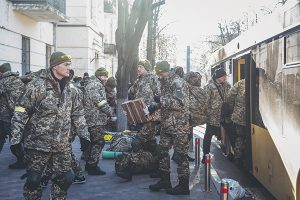It’s been a study in contrasting leadership. On the one hand, Russian President Vladimir Putin is shown on state television giving orders to stony-faced officials, distant at the far end of a long table. On the other, Ukrainian leader Volodymyr Zelensky, in military fatigues on the streets of Kyiv, talks directly to his citizens (and to the world) impromptu via Telegram, urging courage and vowing to stay on in a city under fire.
One, increasingly paranoid, belligerent and isolated, is talking up the threat of a government in Kyiv he says is populated by Nazis. The other, a comedian-turned-president whose popularity had been faltering, has grown into a popular wartime leader with a golden social media touch. The contrast is only becoming starker as Russia’s war fails to go to plan, and catastrophic economic consequences multiply.
The result? There’s growing support abroad for action against Moscow, and at home even elites are showing signs of strain.
It’s easy to overdo this, of course. It’s early days in what could be a drawn-out conflict, and Putin has long managed to survive even deeply unpopular moves. He has a firm grip on Russia’s political hierarchy and, by and large, control of television, which is still the way most of his citizens consume news.
Russians may turn to state newscasts less than they used to, but they don’t necessarily trust Western alternatives. Before the invasion, most blamed the US and Nato for escalating tensions, Moscow’s version of events. But there’s also a risk, in the fog of events, that we allow cynicism to mask the obvious. This is very much Putin’s war, and on all fronts — military, economic and propaganda — he is struggling.
What the Russian president hoped for was a swift assault on Ukraine that solved what he saw as security concerns by annihilating his neighbour’s military, forcing the incumbent government to flee and installing a loyal pro-Moscow alternative, all of which could be sold at home as a painless, cost-free “operation,†not a war.
State broadcasts have stuck with this. They have emphasized the supposed speed of progress, relayed barely credible stories of Ukrainians laying down arms and cheering crowds — and while casualties have finally been mentioned, there is no detail. Words like “invasion†are off-limits, as is any hint of the brutality of a war in a country many Russians have close ties to.
But it’s becoming hard to sustain, with even mobile crematoriums apparently being used to cover up combat losses and avoid troublesome images of body bags and funerals.
In part, that’s down to social media, which far more Russians use today than did in 2014. But there’s also the fact that while Russia may have the hardware, the power of the narrative sits with Ukraine. There are the striking images, like that of the single Russian body covered in snow, of ordinary Ukrainian women turned defenders of Kyiv, or of families huddled in subway stations to escape Russian rockets. There are tales of heroism and humor, as with the Ukrainian driver who stopped by Russian vehicles that had run out of gas, asking the soldiers if they needed help being towed “back to Russia†before driving off. Or, with the island military outpost which found itself facing a Russian warship. Their profane answer to requests to lay down arms has become a rallying cry.
There are no equivalent Russian tales to galvanise opinion at home or overseas. As importantly, Zelenskiy and his administration have understood the power of reaching out directly to ordinary Russians over the border, and he has done so, speaking emotionally in his native Russian. Kyiv publishes footage of prisoners, many of them young conscripts, and has launched a website for Russian families seeking news on killed or captured fighters. That pain will not be easily silenced.
Crucially for the home front, all of this comes as economic blows are raining down. Most Russians expected to be shielded from at least the short-term impact of sanctions — instead they now face long queues at cash machines to withdraw foreign currency, with the ruble tumbling and the central bank, a critical backstop for the financial sector, itself a target of Western sanctions. The country’s key interest rate has more than doubled to 20%. Prices will be hard to contain. Putin has long sought to position himself as the country’s savior and the provider of stability after the economic chaos of the 1990s — and yet the scenes in Moscow shopping malls have been reminiscent of the currency crisis of 1998. Yes, much of the discontent and disquiet is still private. This is a regime that is bruised and dangerously cornered, not dead.
But, in unusual numbers and from unusual quarters, Russians are voicing their discontent. The war has turned the ill-defined threat posed by an autocratic leadership into a concrete one, a very real threat to the country, to individuals’ families and to their future. Street protests reflect that, with numbers remarkable given the high levels of repression. Independent monitor OVD-Info reports 5,933 people have been arrested.
Celebrities are joining in, speaking up if not against Putin, then against his war — like hip-hop artist Oxxxymiron, who cancelled a series of concerts: “I know that most people in Russia are against this war. I am sure that the more people speak up, the faster we can end this nightmare.†At an international gathering of climate scientists, a member of the Russian delegation apologised “on behalf of all Russians†for failing to prevent the conflict.
Most crucial of all to the survival of the regime, cracks are beginning to show among businesses, and in the elite, as oligarchs and their children, assets devastated by sanctions and caught off-guard by Putin’s belligerent turn, finally find moral compasses. Ukrainian-born billionaire Mikhail Fridman described the war as “a tragedy,†while Oleg Deripaska, a man who once wordlessly endured televised humiliation from Putin, now calls for negotiations. Perhaps this is what the beginning of the end looks like.
—Bloomberg
Clara Ferreira Marques is a Bloomberg Opinion columnist and member of the editorial board covering commodities and environmental, social and governance issues. Previously, she was an associate editor for Reuters Breakingviews, and editor and correspondent for Reuters in Singapore, India, the UK, Italy and Russia
 The Gulf Time Newspaper One of the finest business newspapers in the UAE brought to you by our professional writers and editors.
The Gulf Time Newspaper One of the finest business newspapers in the UAE brought to you by our professional writers and editors.

